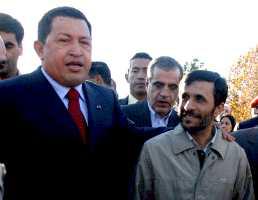Despite massive election spending by the upper classes of Iran, and likely covert interference by the US Government and other Western governments and their regional lackeys, the people’s candidate, Mahmoud Ahmadinejad, has been elected Iran’s President. The course of his rise to power, as well as his background, viewpoints, and proposed policies, are so reminiscent of those of Venezuela’s Hugo Chavez that the similarity cannot be accounted for simply by charging Ahmadinejad with populism, a demonstrably false charge that has all too often been leveled against President Chavez by his class enemies.
The similarity to Chavez reaches uncanny proportions. Here is a quote from Ahmadinejad, which is something Chavez might have said: "The country's biggest capital today is the oil industry and our oil reserves … The atmosphere ruling over our deals, production and exports is not clear. We should clarify it … I will cut the hands off the mafias of powers and factions who have a grasp on our oil, I stake my life on this ... People must see their share of oil money in their daily lives." Iran’s Oil Minister Bijan Zanganeh, as well as OPEC Governor Hossein Kazempour Ardebili openly supported Ahmadinejad's opponent in the second round of the election. It is expected that they will both be removed from their posts once Ahmadinejad assumes the Presidency in August.
He has been labeled, meaninglessly but conveniently, an ultra-conservative. If fighting for the people’s interests requires being an “ultra-conservative,” I have no problem with that. If it takes “ultra-conservatism” to battle neo-liberalism, I have no problem with that.
The way I see it, progressives need to attend to two points:
First, if Ahmadinejad’s actual policies during the first few months of his presidency confirm the image of him as a progressive, we must not neglect the task of supporting him, meanwhile not neglecting the equally important task of redoubling our efforts to support Chavez.
Second, Ahmadinejad’s election may alter the entire dynamic and significance of Iran’s domestic and international policies. Domestically, it may inject new energy into the popular character of the Iranian Revolution. Internationally, as well as regionally, it would be an example of what true home-grown democracy looks like in the Middle East, as opposed to US-imposed “democracy” at the point of a gun meant only to serve US interests.
The US Government and its accomplices will doubtless continue to do all in their power to undermine any progress in Iran and Venezuela. Their efforts in Venezuela have so far been fruitless, and the Bolivarian Revolution appears to have struck deep and unshakeable roots. Let us hope their criminal intentions will be equally futile in the case of Iran.
The similarity to Chavez reaches uncanny proportions. Here is a quote from Ahmadinejad, which is something Chavez might have said: "The country's biggest capital today is the oil industry and our oil reserves … The atmosphere ruling over our deals, production and exports is not clear. We should clarify it … I will cut the hands off the mafias of powers and factions who have a grasp on our oil, I stake my life on this ... People must see their share of oil money in their daily lives." Iran’s Oil Minister Bijan Zanganeh, as well as OPEC Governor Hossein Kazempour Ardebili openly supported Ahmadinejad's opponent in the second round of the election. It is expected that they will both be removed from their posts once Ahmadinejad assumes the Presidency in August.
He has been labeled, meaninglessly but conveniently, an ultra-conservative. If fighting for the people’s interests requires being an “ultra-conservative,” I have no problem with that. If it takes “ultra-conservatism” to battle neo-liberalism, I have no problem with that.
The way I see it, progressives need to attend to two points:
First, if Ahmadinejad’s actual policies during the first few months of his presidency confirm the image of him as a progressive, we must not neglect the task of supporting him, meanwhile not neglecting the equally important task of redoubling our efforts to support Chavez.
Second, Ahmadinejad’s election may alter the entire dynamic and significance of Iran’s domestic and international policies. Domestically, it may inject new energy into the popular character of the Iranian Revolution. Internationally, as well as regionally, it would be an example of what true home-grown democracy looks like in the Middle East, as opposed to US-imposed “democracy” at the point of a gun meant only to serve US interests.
The US Government and its accomplices will doubtless continue to do all in their power to undermine any progress in Iran and Venezuela. Their efforts in Venezuela have so far been fruitless, and the Bolivarian Revolution appears to have struck deep and unshakeable roots. Let us hope their criminal intentions will be equally futile in the case of Iran.

President Chavez met Mr Ahmadinejad, then Tehran's mayor, while visiting Iran in 2004